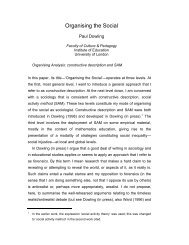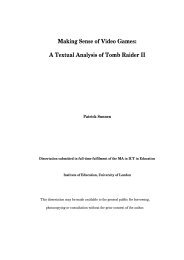Research and the Theoretical Field - Pauldowling.me
Research and the Theoretical Field - Pauldowling.me
Research and the Theoretical Field - Pauldowling.me
You also want an ePaper? Increase the reach of your titles
YUMPU automatically turns print PDFs into web optimized ePapers that Google loves.
48<br />
concerning <strong>the</strong> relations between software <strong>and</strong> gender relations in groupwork<br />
from which we might move on to an experi<strong>me</strong>ntal study. Of course, in <strong>the</strong><br />
context of a masters dissertation, <strong>the</strong>re is unlikely to be <strong>the</strong> ti<strong>me</strong> or space (in<br />
terms of wordcount) for two phases, but <strong>the</strong> subsequent research can always<br />
be carried out later. In fact, Nicholson et al are not quite as a<strong>the</strong>oretical as I<br />
have pretended, thus:<br />
In addressing <strong>the</strong> above questions, we are operating under several assumptions<br />
related to successful collaborative composing. We consider <strong>the</strong> ideal st<strong>and</strong>ard<br />
for successful collaborative writing to involve participants who have a shared<br />
goal or purpose for <strong>the</strong> activity, a mutually agreed upon strategy for regulating<br />
turn-taking, <strong>and</strong> <strong>the</strong> skills for building upon <strong>and</strong> incorporating one ano<strong>the</strong>r's<br />
ideas. We also believe that successful collaborative partners share in a range of<br />
social roles while interacting <strong>and</strong> composing <strong>and</strong> do not differ dramatically in<br />
<strong>the</strong>ir relative status within <strong>the</strong> interaction, Finally, successful collaborations within<br />
this specific context should result in a product where <strong>the</strong> majority of ele<strong>me</strong>nts<br />
(eg, text <strong>and</strong> illustrations) were jointly produced.<br />
(Nicholson et al, 1998; p. 5)<br />
But all of this remains quite loose.<br />
So, <strong>the</strong>re are traditions of research that exhibit strongly institutionalised<br />
<strong>the</strong>oretical spaces, most particularly, <strong>the</strong> natural sciences. Here, insofar as<br />
<strong>the</strong> ‘universe’ is ‘known’ in advance, we expect a predominance of<br />
experi<strong>me</strong>ntal research designs operationalising tightly fra<strong>me</strong>d research<br />
questions. Alternatively, <strong>the</strong>re are traditions of research that do not exhibit<br />
such strong institutionalisation of <strong>the</strong>oretical spaces. Here, each new<br />
empirical setting is more likely to be thought of as <strong>the</strong> relatively unknown,<br />
un<strong>the</strong>orised. The extended fieldwork dem<strong>and</strong>ed by ethnography <strong>and</strong> thick<br />
description may not be plausible in <strong>the</strong> context of a masters degree.<br />
Never<strong>the</strong>less, exploratory research is perfectly viable <strong>and</strong> can be highly<br />
productive. In <strong>the</strong> case of exploratory research, we do not want to formulate a<br />
precisely worded research question in advance, indeed we cannot do so if we<br />
do not have available <strong>the</strong> required <strong>the</strong>oretical terminology. Ra<strong>the</strong>r, we are<br />
likely to begin our research with a far more loosely defined research question<br />
or problem. Naturally, by <strong>the</strong> end of <strong>the</strong> research process, we hope to be in a<br />
position to provide a conclusion that constitutes a more well-defined<br />
<strong>the</strong>oretical space. Of course, <strong>the</strong>re is a whole range of possibilities between<br />
<strong>the</strong>se extre<strong>me</strong>s where <strong>the</strong>re is a sufficient definition of <strong>the</strong> <strong>the</strong>oretical advance<br />
to enable <strong>the</strong> formulation of a <strong>me</strong>aningful question—Douglas’s ‘cultural <strong>the</strong>ory’<br />
would be an example (though this is not to say that this is necessarily how<br />
she herself proceeds). Here, we may introduce an ele<strong>me</strong>nt of experi<strong>me</strong>ntal<br />
design, for example, in choosing to explore two contexts that differ in one<br />
important respect, but that are arguably similar o<strong>the</strong>rwise. The reformulated<br />
groupwork/gender/software question, for example, might be operationalised<br />
by:<br />
1. setting up two mixed gender groups that are as similar as we can make<br />
<strong>the</strong>m;<br />
2. setting <strong>the</strong>m tasks using two different kinds of software;<br />
RESEARCH & THE THEORETICAL FIELD




